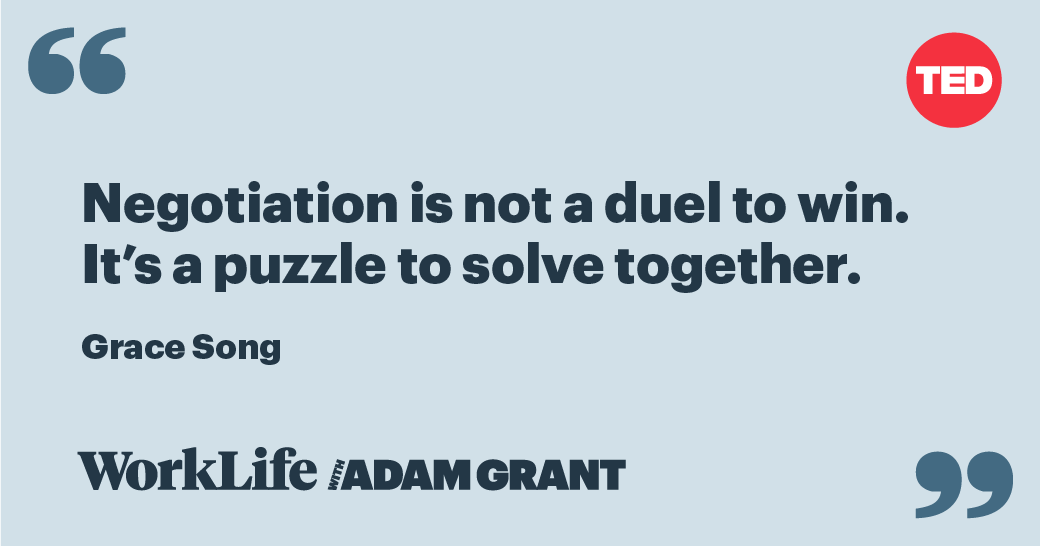
The Science of the Deal
In work and in life, we negotiate constantly. Not just about salaries, roles, and partnerships—we also negotiate on what’s for dinner, when to put our kids to bed, and whether it’s safe to leave the house. It often feels like there’s a tension between getting the results we want and maintaining the relationships that matter to us. But according to the data, that tension is much more in our minds than in reality.
On today’s episode of WorkLife, learn from one negotiator who overcame being a pushover, another who stopped being a steamroller, and a third who pulled off one of the most consequential agreements in human history. Plus, find out what happened when my students challenged me to go out and negotiate something non-negotiable.
You can listen here and discuss below. Highlights:
Bargain for the future, not just the present. Expert negotiators dedicate more than twice as much planning time to long-term considerations as their peers. The further you stretch out the time horizon, the less fixed the pie becomes—and the more possibilities you can sketch out for helping one another.
Look for ways to benefit the other party that cost you nothing. Research shows that the more intelligent negotiators are, the better their counterparts do. Great negotiators don’t just care about maximizing their own success—they’re also motivated to help the other person succeed.
Don’t be afraid of making the first offer. Most people hesitate to tip their hand before they get to see the other person’s cards. But the evidence shows that’s backward: every dollar higher in the first offer translates into about 50 cents more in the final agreement.
Instead of proposing one number, start with a range. In a salary negotiation, if your target is $60k, you walk away with a better result and a stronger relationship if you ask for $60-65k. It shows flexibility and signals a bottom line without disclosing one.
Negotiate on behalf of others, not just yourself. There’s a wealth of evidence that this can erase the gender backlash for women at the bargaining table: it makes toughness an act of caring.
DISCUSSION QUESTIONS
(1) When you negotiate, what questions do you ask to figure out what matters to the other person?
(2) When you’re dealing with a steamroller, how do you convince them to shift from win-lose to win-win?
(3) If your counterpart is only interested in the short-term, what have you learned about getting them to think more long-term?
(4) When you’re concerned about coming across as selfish, who can you focus on representing?
New episodes of WorkLife with Adam Grant come out every Tuesday this spring. Listen now on Apple Podcasts, Spotify, or on your favorite podcast player.

Practice Partner at JGC Philippines, Inc.
3yI strongly agree. Collaborations and Partnerships does not only revolve around profit. Developing connections and improving relations is also a fundamental element. Instead of focusing on getting the upper hand on negotiations, I personally would prefer mutual benefits or as we like to call it a "win-win" for both parties development.
𝑪𝒉𝒊𝒆𝒇 𝑬𝒙𝒆𝒄𝒖𝒕𝒊𝒗𝒆 𝑶𝒇𝒇𝒊𝒄𝒆𝒓 𝒂𝒕 𝑺𝑨 𝑭𝒂𝒄𝒊𝒍𝒊𝒕𝒚 𝑺𝒆𝒓𝒗𝒊𝒄𝒆𝒔 ⚡ Commercial Cleaning Services ⚡ Waste Management Services ⚡ Office Moves ⚡ Let's connect or email: sandyalcara033@gmail.com 📩
3yGreat article! Every situation requires understanding not just in our personal lives but also in dealing business with other people. Thanks for sharing this.
...
3yVision.
Enterprise Business Analysis & Transformation Programs focused on Return on Invested Capital (ROIC).
4yOh God...now they want to moralize the objectives of negotiation. I suppose it’s a natural progression from the socialization of price discovery. If you ask me, this is the virus that is causing the most damage.
Chief Labor and Employment Counsel at Scout Motors
4yI have practiced in this way my entire career as a labor negotiator. In the end the relationships and trust you developed with those on the other side of the table will get the deals done!